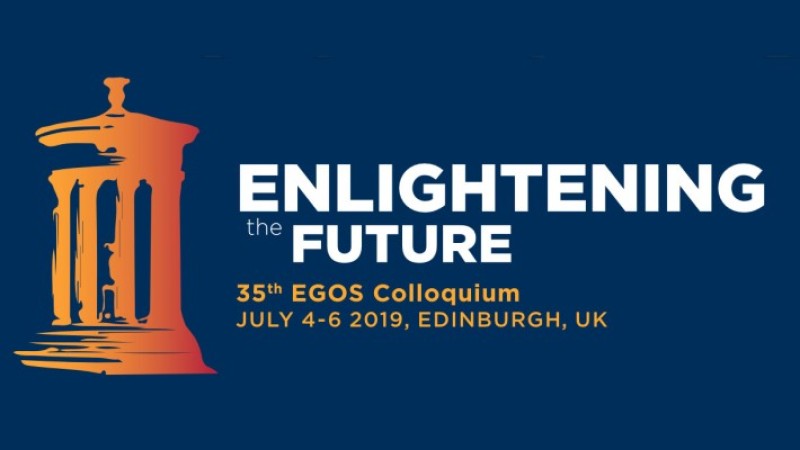PDW 01: The Challenges of Writing about Emergence and Temporality in Empirical Studies of Time and Process
Call for Applications
Facilitators:
Tor Hernes, Copenhagen Business School, Denmark
Anthony Hussenot, Université Côte d’Azur, France
Barbara
Simpson, University of Strathclyde, United Kingdom
Purpose
The purpose of this Pre-Colloquium Development
Workshop (PDW) is to discuss the multiple challenges of writing about and presenting studies influenced by process thinking
and dealing with issues of temporality. It is offered as a joint venture between the EGOS Standing Working Group (SWG) 01
on ‘Doing Process Research’ and SWG 10 on ‘Time and Temporality’, recognizing the strong synergies between these two groups.
How do we present time, temporality, emergence, transformation and relationality in research accounts, especially
if dynamic accounts of organizational life are best described participatively (Helin, 2015), from within? Ethnographic craftsmanship
is key to doing process research (van Hulst et al., 2017), but how can we present and write about time and process in ways
that further both readers’ and writers’ sense of flow and temporality in organization studies? Withness-thinking and writing
from within the flow of experience has been suggested as the raison d’être of process ontological inquiry (Shotter, 2015),
as opposed to about-ness studies of already objectified and categorized structures, elements and entities of organizational
life. Situating writing from within the flow of conversation, writing becomes “a fully engaged approach in which [author]
had to actively listen and passionately connect to that which, and to those who, [author] was writing about” (Helin, 2015,
p.183). The ways in which time and temporality could be presented may create additional challenges. For example, it is challenging
to present different forms of time (e.g. chronological vs event-based time) and to argue why one may be more relevant for
a certain phenomenon than another. Thus, we cannot take for granted that one temporal form is somehow superior to other(s).
Instead, we need to argue through why one or another form may be more or less appropriate depending on the specific circumstances.
Writing empirical texts is not an isolated practice. The practice of writing, and the process of exploring in
the writing, relates to other practices such as reading theory (Spivak, 2014; Jackson & Mazzei, 2017), and listening to
case study audio recordings (Helin, 2015; Revsbæk, 2018; Revsbæk & Tanggaard, 2015). Pushing the boundaries of modes of
writing and ways of presenting process studies, time and temporality is important. The development of vocabulary, and the
community dynamic to advance the development of vocabulary and modes of expression and presentation, is key in advancing process
studies and studies of time and temporality in organizations as any writer and presenter writes in the anticipation of a reader’s
receptiveness to what is written about and how this is presented. Bold and imaginative ways of presenting process and temporal
studies of organization and time is called for to form part of the community that process researchers may write in the anticipation
of in the future.
This PDW is mainly designed to help PhD students and early career researchers, although
it will not be closed to more experienced scholars. Based on feedback collected after previous workshops, we realize that
researchers often struggle with writing up their studies and with presenting their data in a convincing way, and may feel
isolated in their struggle. Our workshop aims to frankly discuss these issues, and to develop a sense of community amongst
early career researchers who share an interest in studying temporality and process.
Format
Generally
speaking, the PDW will alternate between exercises and discussions in small groups and collective reflection. Prior to the
workshop, the participants will receive a few instructions on how to prepare for the workshop.
Application
Please submit – via the EGOS website – by April 2, 2019 a single document of application (.doc, .docx or .pdf file) that includes the following information:
A short letter explaining why you would like to participate in this PDW and describing briefly the empirical work you are currently pursuing (1 full page maximum)
A short text (3 full pages maximum) presenting a short excerpt of a current presentation of empirical material from a process study or study of time, in which you identify and reflect on the challenges you are currently facing in terms of the writing and presentation of process and time
In addition, participants are asked to bring an inspirational text, example, a visual or
an artifact that guides them or serves as inspiration in their efforts to develop ways of presenting process and time. – We
will accept a maximum of 30 people.
References
- Helin, J. (2015): “Writing Process After Reading Bakhtin: From Theorized Plots to Unfinalizable “Living” Events.” Journal of Management Inquiry, 24 (2), 174-185.
- Jackson, A.Y., & Mazzei, L.A. (2017): “Thinking with Theory: A New Analytic for Qualitative Inquiry.” In: N.K. Denzin & Y. S. Lincoln (eds.): The SAGE Handbook of Qualitative Research. Thousand Oaks, CA: SAGE Publications, 717–737.
- Revsbæk, L. (2018): “Resonant Experience in Emergent Events of Analysis.” Qualitative Studies, 1 (1), 24.
- Revsbæk, L., & Tanggaard, L. (2015): “Analyzing in the Present.” Qualitative Inquiry, 21 (4), 376–387.
- Shotter, J. (2015): “On ‘Relational Things’: A New Realm of Inquiry Pre-Understandings and Performative Understandings of People’s Meanings.” In: R. Garud, B. Simpson, A. Langley & H. Tsoukas (eds.): The Emergence of Novelty in Organizations. Oxford: Oxford University Press, 56–79.
- Spivak, G.C. (2014): Readings. London: Seagull Books.
- van Hulst, M., Ybema, S., & Yanow, D. (2017): “Ethnography and Organizational Processes.” In A. Langley & H. Tsoukas (eds.): The SAGE Handbook of Process Organization Studies. London: SAGE Publications, 223–236.


